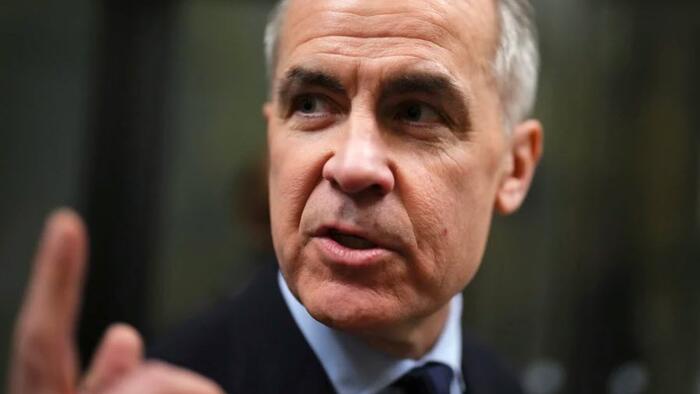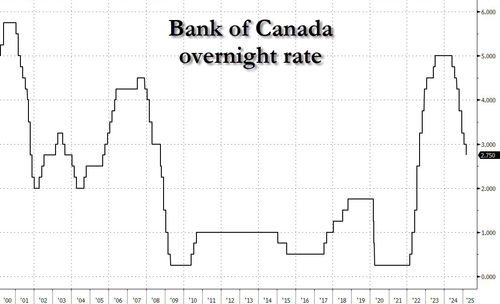


The Bank of Canada cut interest rates by a quarter percentage point - as expected - and called the trade battle with the US a “new crisis,” but pushed back on expectations that policymakers were on a predetermined cutting path.
“We're now facing a new crisis. Depending on the extent and duration of new US tariffs, the economic impact could be severe,” Bank of Canada Governor Tiff Macklem said in prepared remarks of an opening statement.
Macklem called the uncertainty of the tariff dispute “pervasive” and said that it was “already causing harm.”
Officials said the “continuously changing” US tariff threat was hitting consumers' spending intentions and limiting businesses' plans to hire and invest.
At the same time, Macklem said the bank “will proceed carefully with any further changes” to borrowing costs, and officials would “need to assess both the upward pressures on inflation from higher costs and the downward pressures from weaker demand.”
There's lots of red in the red-line from the prior statement:
Breaking down the details:
Economy
Job market
Inflation
Tariffs
Perhaps most notably, Canadian policymakers also reiterated that there's a limit to how much they think they can intervene.
The tariff battle will come with an inflation shock, the bank said, and it will “be tracing the impact of cost pressures through to consumer prices.”
“Monetary policy cannot offset the impacts of a trade war. What it can and must do is ensure that higher prices do not lead to ongoing inflation.”
Macklem concluded by noting that the retaliatory measures and the recent depreciation of the loonie against the US dollar are among the rising costs of the trade dispute.
“A weaker Canadian dollar and new retaliatory tariffs both make imports more expensive. Businesses are also telling us that uncertainty itself imposes new costs.”
All of which is wonderfully ironic given the tough talk from newly crowned globalist PM Mark Carney who was full of piss and vinegar towards Trump's tariff threats:
“My government will keep our tariffs on until the Americans show us respect and make credible, reliable commitments to free and fair trade,” Carney said in a statement.
Good luck Mark.
“President Trump’s latest tariffs are an attack on Canadian workers, families and businesses,” Carney said in the statement.
“My government will ensure our response has maximum impact in the US and minimal impact here in Canada, while supporting the workers impacted.”
The reaction was muted for now in the Loonie...
BoC's decision comes just minutes after US Commerce Secretary Howard Lutnick discussed the potential for discussions with Canada on tariffs...
And that followed a Bloomberg report that Canada will announce counter-tariffs on about C$30 billion ($20.8 billion) of US-made products - including hundreds of consumer items such as alcoholic drinks, cosmetics and peanut butter - on Wednesday, according to people familiar with the matter.
In a news conference Wednesday announcing the retaliatory duties, a Canadian government spokesman called Trump's tariffs "completely unjustified, unfair and unreasonable."
"The U.S. administration is once again inserting disruption and disorder into an incredibly successful trading partnership and raising the costs of everyday goods for Canadians and American households alike," said François-Philippe Champagne, Canada's minister of innovation, science and industry.
Finance Minister Dominic LeBlanc, the government's point person on Canada-U.S. relations, said Trump's attack on Canadian industry is "unjustified and unjustifiable" and the government must hit back as the U.S. inserts "disruption and disorder" into what was once one of the most successful trading relationships in the world.
"We will not stand idly by while our iconic steel and aluminum industries are being unfairly targeted," he said.
Canada's announcement comes despite a detente having been reached Tuesday with the Trump administration to resolve threats of a 25% surcharge on American consumers of Canadian electricity. Trump had threatened Canada with steel and aluminum tariffs climbing to 50% if the province of Ontario followed through on the surcharge.



